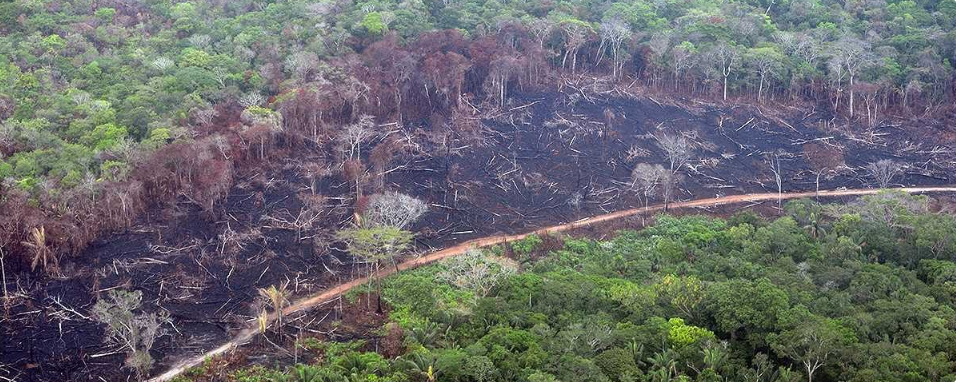- One of Colombia’s biggest active FARC dissident groups is the Central Armed Command (EMC), controlling much of the Amazon rainforest in the departments of Guaviare, Meta and Caquetá.
- Some experts argue that there’s a direct correlation between the EMC’s actions and deforestation trends in the Amazon. Between 2022 and 2023, deforestation dropped by 51% when the group was cooperating with government peace talks.
- With those peace talks breaking down, deforestation is on the rise again. Critics are calling on the government to prioritize the environment in future negotiations.
Colombia President Gustavo Petro took office in 2022 with ambitious plans to combat climate change and lead a clean energy transition — a major challenge for a country that has struggled with high rates of deforestation and an economic reliance on oil and gas exports.
A little more than two years into his government, Petro has seen deforestation rates fall and then rise again, raising questions about what policies actually work to halt deforestation for the long haul. During his campaign, he promised to regulate agribusiness, optimize existing farmland and create new protected areas. But the policies with the most impact have had more to do with security than conservation.
Armed groups have major sway in rural areas, controlling everything from farming practices and logging to coca cultivation. Their actions are key to the fate of Colombia’s rainforests, a new report from Crisis Group argues.
“Armed groups’ tightening grip on the Colombian Amazon has further jeopardized the health of a forest that plays a crucial role in the planet’s climate,” the report states. “People living under these groups’ yoke have been left vulnerable to the whims of criminals bent on expanding their illicit businesses.”
At the start of his government, Petro launched a “total peace” plan to start talks with some of the largest armed groups, including the National Liberation Army (ELN) and dissidents of the former Revolutionary Armed Forces of Colombia (FARC), which agreed to a peace deal in 2016. Today, one of the biggest active FARC dissident groups is the Central Armed Command (EMC), controlling much of the Amazon in the Guaviare, Meta and Caquetá departments.
The EMC emerged in 2016, made up of a group of guerrilla fighters who rejected the government’s terms for the FARC peace deal. Like the former FARC, the EMC has made efforts to protect the rainforest because an unbroken canopy allows for better concealment. But they also understand that the rainforest is a source of revenue. It can also be a bargaining chip when dealing with a government that’s trying to prioritize conservation.

For many experts, there’s a direct correlation between the EMC’s actions and deforestation trends. Between 2022 and 2023, deforestation dropped by 51% in parts of the Amazon that the group controlled. That also happens to be the time period in which the EMC implemented restrictions on logging, threatening and fining people who disobeyed, and even assigning some offenders “community labor.” It’s also distributed pamphlets and “co-existence manuals” to explain how to care for the country’s natural resources.
“They’ve gradually become a de-facto environmental authority,” said Juanita Vélez, a journalist with the Conflict Responses Foundation, which studies armed conflicts in Colombia. “They determine what happens with environmental issues in their areas of influence — and that goes beyond just deforestation. It has to do with land, with cattle ranching.”
Deforestation rates started rising again in 2023, around the time that peace talks with the government were breaking down. Numerous killings by the group, including of Indigenous people and minors who had been forcibly recruited, led the Petro government to call off a ceasefire.
The EMC lifted logging restrictions and allowed some trees to be cut down in exchange for a tax. It also continued to add to a network of thousands of kilometers of roads through the rainforest.
“Land razing appears to have declined and then shot up again in lockstep with the EMC’s wishes,” the Crisis Group report said. “…[The group] loosened restrictions on deforestation in part to demonstrate to the government how much harm it can inflict on the environment, a topic not only close to Petro’s heart but also integral to his political cause.”
This year, deforestation continues to be a problem as the negotiations push on, albeit at a slow pace and with only one fraction of the EMC. In the meantime, the group has reinforced its ban on environment ministry and National Parks Service personnel from entering protected areas of the Amazon.
That makes it nearly impossible to carry out other kinds of conservation initiatives, including patrols, monitoring and community education.
Unlike past negotiations, Petro’s “total peace” plan doesn’t prioritize reaching a complete peace deal all at once. Instead, it focuses on incremental advances through partial agreements, Crisis Group noted. That puts the government in a position to include stopping deforestation as an immediate provision in the current negotiations, with another goal being to establish an agricultural frontier in the rainforest that the EMC will respect.
The government should also reclaim control of protected areas and defend local communities from EMC violence, the report said.
“In the immediate future, negotiations with the EMC may be the best — and possibly only — means of reducing deforestation in the country’s Amazon regions,” the report said.
Banner image: Deforestation in the Colombian Amazon. Photo courtesy of Fundación para la Conservación y el Desarrollo Sostenible (FCDS).
Esta publicación fue publicada originalmente en Mongabay el 31 de octubre de 2024


Comentarios: